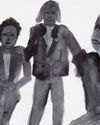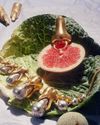The very definition of the suffix “-ish”, multicultural multihyphenate Yara Shahidi seeks to lead her generation of diversity in unity.

IT WOULD BE disingenuous to fall back on clichés when it comes to talking about Yara Shahidi and comparing her with teenagers her age — not only for her sake, but for her peers. I had to check myself from making sweeping statements such as “while other 18-year-olds were busy posting selfies on Instagram, Shahidi organised a political outreach programme and was accepted to Harvard”, because they ring hollow in light of recent events. Just mere days after witnessing the deaths of 17 of their friends and teachers by the hand of a former schoolmate, the survivors of the February high school shooting in Parkland, Florida, organised #NeverAgain, a national anti-gun movement to promote gun control. They also faced off with lawmakers about their inaction over the hazardously lax firearms regulations, and inspired fellow teenagers to march, protest and stage school walkouts across the United States.
Therefore, instead of pitting Shahidi against an entire population of young millennials, it’s more appropriate to view the actress-activist as one of the leading voices of a new generation of politically inclined and socially involved teenagers. Born to an Iranian photographer father and an actress mother with African-American and Native American ancestry, Shahidi began acting as a child, eventually landing the role of Zoey Johnson on the ABC sitcom “Black-ish” and subsequently as the main character in “Grown-ish”, a spin-off detailing Zoey’s college experience.
However, what sets Shahidi apart from the milieu of young actors is her luminary off-screen activities. Compared to her political one, her fashion resume almost seems frivolous, and they’re not: she is the US brand ambassador for Chanel, has fronted campaigns for GAP, Aerie and Beyonce’s Ivy Park label, and was dressed for the red carpet by Prada, Ralph Lauren, Giambattista Valli and Etro, amongst others.
Diese Geschichte stammt aus der April 2018-Ausgabe von T Singapore: The New York Times Style Magazine.
Starten Sie Ihre 7-tägige kostenlose Testversion von Magzter GOLD, um auf Tausende kuratierte Premium-Storys sowie über 8.000 Zeitschriften und Zeitungen zuzugreifen.
Bereits Abonnent ? Anmelden
Diese Geschichte stammt aus der April 2018-Ausgabe von T Singapore: The New York Times Style Magazine.
Starten Sie Ihre 7-tägige kostenlose Testversion von Magzter GOLD, um auf Tausende kuratierte Premium-Storys sowie über 8.000 Zeitschriften und Zeitungen zuzugreifen.
Bereits Abonnent? Anmelden

Look At Us
As public memorials face a public reckoning, there’s still too little thought paid to how women are represented — as bodies and as selves.

Two New Jewellery Collections Find Their Inspiration In The Human Anatomy
Two new jewellery collections find their inspiration in the human anatomy.

She For She
We speak to three women in Singapore who are trying to improve the lives of women — and all other gender identities — through their work.
Over The Rainbow
How the bright colours and lively prints created by illustrator Donald Robertson brought the latest Weekend Max Mara Flutterflies capsule collection to life.

What Is Love?
The artist Hank Willis Thomas discusses his partnership with the Japanese fashion label Sacai and the idea of fashion in the context of the art world.

The Luxury Hotel For New Mums
Singapore’s first luxury confinement facility, Kai Suites, aims to provide much more than plush beds and 24-hour infant care: It wants to help mothers with their mental and emotional wellbeing as well.

Who Gets To Eat?
As recent food movements have focused on buying local or organic, a deeper and different conversation is happening among America’s food activists: one that demands not just better meals for everyone but a dismantling of the structures that have failed to nourish us all along.

Reimagining The Future Of Fashion
What do women want from their clothes and accessories, and does luxury still have a place in this post-pandemic era? The iconic designer Alber Elbaz thinks he has the answers with his new label, AZ Factory.

A Holiday At Home
Once seen as the less exciting alternative to an exotic destination holiday, the staycation takes on new importance.
All Dressed Up, Nowhere To Go
Chinese supermodel He Sui talks about the unseen pressures of being an international star, being a trailblazer for East Asian models in the fashion world, and why, at the end of the day, she is content with being known as just a regular girl from Wenzhou.